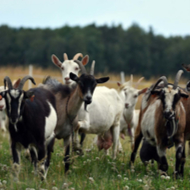
The Pirbright Institute has developed two breakthrough DIVA vaccines.
The Pirbright Institute has developed two new vaccine candidates which could contribute to the eradication of peste des petits ruminants virus (PPRV).
Peste des petits ruminants virus, characterised by severe morbidity and mortality rates, causes severe disease in small ruminants such as goats and sheep, particularly in Africa, Asia and the Middle East.
A global effort is focused on developing a vaccine that can allow farmers to differentiate between animals who have acquired immunity through vaccination, and those who have acquired immunity through natural infection, known as a DIVA vaccine.
Both of Pirbright's vaccine candidates can differentiate between vaccinated and infected animals, and were created by taking current vaccine strands of PPRV and replacing the variable part with the N gene with that from a related virus, dolphin morbillivirus (DMV).
Professor Satya Parida, who led the research, commented: “This is a key breakthrough in the global eradication of PPRV as a DIVA vaccine was the next piece of the puzzle.
“It allows for surveillance of animals to determine disease spread and monitor outbreaks, while also protecting animals and preventing virus shedding.
“We also showed that these novel vaccines can protect against any of the four lineages of PPRV. The next step is to test the efficacy of these DIVA vaccines on a larger number of animals to further establish the safety and potency before they are used in the field.”
Image (C) The Pirbright Institute



 The RCVS has announced a new version of its 1CPD mobile app, with enhanced features for veterinary surgeons and veterinary nurses to record their continuing professional development.
The RCVS has announced a new version of its 1CPD mobile app, with enhanced features for veterinary surgeons and veterinary nurses to record their continuing professional development.